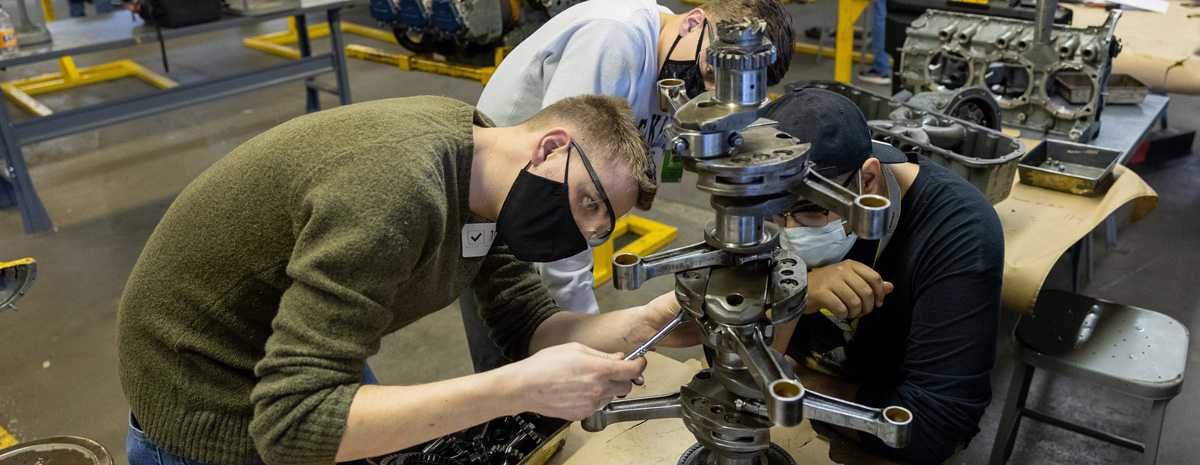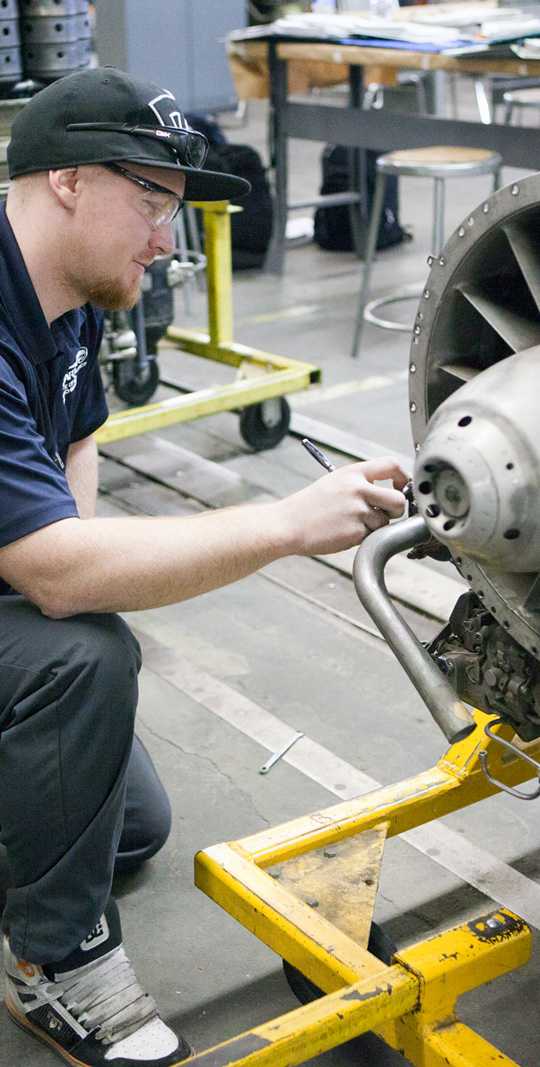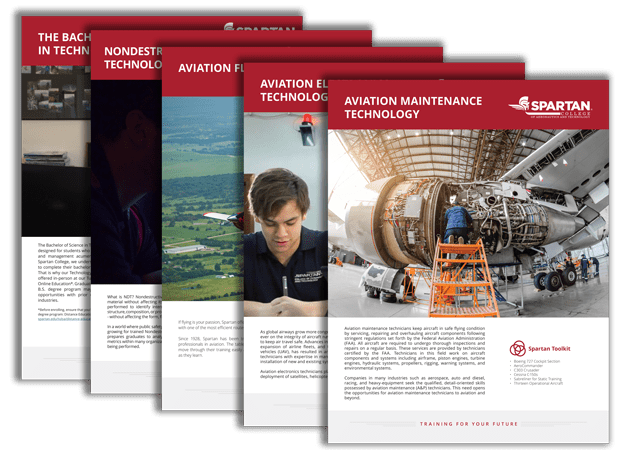Aviation Maintenance Technology In Tulsa Area

Training the Next Generation of Aviation Maintenance Technicians
Successful completion qualifies the graduates to take the written, oral and practical tests with the Federal Aviation Administration for the Mechanic’s Certificate with both Airframe and Powerplant Ratings. FAA testing consists of three (3) written tests and three (3) parts to an oral and practical (O&P) exam. Spartan College is a Designated FAA Test Center for the written tests.
Interested in Learning More?
Program Details

Aviation Maintenance Technology (Diploma)
17 Months on-ground
Associate of Applied Science Aviation Maintenance Technology (Degree)
20 Months on-ground
Aviation Maintenance Technology – Hybrid Option (Diploma)
20 Months: 12 months online, 8 months on-ground
Associate of Applied Science Aviation Maintenance Technology – Hybrid Option* (Degree)
23 Months: 12 months online, 8 months on-ground, 3 months of Gen Eds online or on-campus
The Aviation Maintenance programs are approved by the Federal Aviation Administration (FAA) and meet the requirements established in the Code of Federal Regulations, Title 14, Chapter 1, Subchapter H, Part 147. These programs are designed to teach students entry-level technical skills in airframe and powerplant. The skills and information taught in the program are applicable to other maintenance industries and professions as well as aviation; therefore, certification is not required upon graduation. Obtaining an A&P certificate is encouraged and provides additional options should you choose to pursue certification. The general education courses in the associate degree program enhance the students’ background and intellectual proficiency.
The importance of aircraft maintenance cannot be denied. Aviation maintenance technicians are the highly-skilled, detail-oriented individuals who keep the airways safe and the planes flying. All US certified aircraft are required to be inspected on a regular basis. The length of time or number of hours of operation as well as the type of aircraft determine those inspection intervals. In most cases these inspection intervals are established jointly between the FAA and the aircraft manufacturer.
On-ground Aviation Maintenance Program
The diploma program is geared towards teaching students the technical skills required to service, repair, and overhaul aircraft components and systems. The knowledge gained through the additional general education courses in the associate degree program may enhance the students’ background and intellectual proficiency so they are more competitive in their chosen professions. Associate degree graduates are eligible to continue with Spartan College’s Bachelor of Science in Technology Management degree program (offered online or on campus).
Partially Online Aviation Maintenance Hybrid Program Option
Spartan College’s partially online aviation maintenance program is meant to be manageable even if you are working full-time or you are finishing up active duty in the military. For international students, the partially online Aviation Maintenance program provides the option of living in your home country for the first part of the program (providing you with a flexible schedule) then relocating to Tulsa, Oklahoma for the second on-campus portion. Before enrolling, ensure that you’re in a state eligible for our online program: Distance Education State Authorization List. Learn more about our Hybrid Online option.
Certification Disclosure Information
*General education classes for the associate portion of the program can be taken via online distance education or on-ground at the Tulsa Campus.

PREPARE FOR TAKEOFF BY GETTING A LAY OF THE LAND
Course Work
Part of the Demand for Airline Technicians
according to the Boeing Pilot Technician Outlook 2021 – 2040.
*Boeing: Pilot and Technician Outlook, http://www.boeing.com/commercial/market/pilot-technician-outlook/
WHAT EQUIPMENT DOES OUR SCHOOL HAVE TO OFFER?
BOEING 727 COCKPIT SECTION
BOEING 727 COCKPIT SECTION
THIRTEEN TRAINING AIRCRAFT
THIRTEEN TRAINING AIRCRAFT
TURBINE FUEL SYSTEM TRAINER
TURBINE FUEL SYSTEM TRAINER
ICE & RAIN CONTROL TRAINER
ICE & RAIN CONTROL TRAINER
CF6 TURBINE ENGINE
CF6 TURBINE ENGINE
Sample Classes
This course covers the theory and operation of reciprocating engines. All internal components are studied, along with how each part functions. A reciprocating engine is disassembled, measured, reassembled, and timed. Upon completion of this course, students are expected to be able to explain the operation of a reciprocating engine.
In this course, aircraft sheet metal structures and different fastening methods are studied in detail. Students will accomplish a wide variety of lab projects leading to an understanding of subject material. Upon successful completion of this course, students are expected to be able to perform all basic tasks required of an aircraft maintenance technician related to metallic structures.
The theory, operation, and maintenance of aircraft hydraulic and pneumatic systems are covered. The troubleshooting, maintenance, and repair of both systems is stressed. Aircraft landing gears, including retraction systems, oleos, brakes, wheels, and tires, are also studied. This course also includes study of aircraft position and warning systems.
Industry Outlook
- An A&P Technician inspects, services and repairs airplanes to ensure they're operating correctly and safely.
- A mechanic is responsible for ensuring that airplanes get regular maintenance and that any problems are fixed correctly.
- Technicians may work on different parts of an aircraft, such as the engine, landing gear, brakes and pumps.
- A Technician may work with special instruments designed specifically for aircraft maintenance. The job may also involve standing on ladders and working at various heights.
- Mechanics service different types of aircraft, such as helicopters, jets and propeller-driven airplanes.
- Airframe specialists, also called airframe or aircraft mechanics, work on all parts of an aircraft with the exception of its instruments, power plant and propulsion system.
- They use precision instruments, X-rays and magnetic equipment to look for cracks.
- In addition, they repair and replace worn or defective parts, sheet metal and composite materials, and they check for problems such as corrosion in an aircraft's fuselage, wings and tail. Most airframe specialists who work on civilian aircraft have combined certification in airframes and power plants and are qualified to work on all parts except instruments; they are called combination airframe and power plant mechanics, or A&P mechanics.
- Replaces or repairs worn, defective, or damaged components, using hand tools, gauges, and testing equipment.
- Tests engine operation, using test equipment such as ignition analyzer, compression checker, distributor timer, and ammeter, to identify malfunction.
- Listens to operating engine to detect and diagnose malfunctions, such as sticking or burned valves.
- Reassembles engine and installs engine in aircraft. Disassembles and inspects engine parts, such as turbine blades and cylinders, for wear, warping, cracks, and leaks. Removes engine from aircraft, using hoist or forklift truck. Services, repairs, and rebuilds aircraft structures, such as wings, fuselage, rigging, and surface and hydraulic controls, using hand or power tools and equipment.
- Adjusts, repairs, or replaces electrical wiring system and aircraft accessories.
- Inspect, test, repair, maintain, and service aircraft.
- Read and interpret aircraft maintenance manuals and specifications to determine feasibility and method of repairing or replacing malfunctioning or damaged components.
- Modify aircraft structures, space vehicles, systems, or components, following drawings, engineering orders and technical publications.
- Examine and inspect engine or other components for cracks, breaks, or leaks.
- Disassemble and inspect parts for wear, warping, or other defects. Assemble and install electrical, plumbing, mechanical, hydraulic, and structural components and accessories, using hand tools and power tools.
- Adjust, align, and calibrate aircraft systems, using hand tools, gauges, and test equipment.
- Test engine and system operations, using testing equipment, and listens to engine sounds to detect and diagnose malfunctions.
- Service and maintain aircraft systems by performing tasks, such as flushing crankcase, cleaning screens, greasing moving parts, and checking brakes.
- Perform maintenance IAW FAA approved technical data. Research FAA technical data to locate applicable data relevant to assigned tasks.
- Replaces or repairs worn, defective, or damaged components, using hand tools, gauges, and testing equipment.
- Tests engine operation, using test equipment such as ignition analyzer, compression checker, distributor timer, and ammeter, to identify malfunction.
- Listens to operating engine to detect and diagnose malfunctions, such as sticking or burned valves.
- Reassembles engine and installs engine in aircraft.
- Disassembles and inspects engine parts, such as turbine blades and cylinders, for wear, warping, cracks, and leaks.
- Removes engine from aircraft, using hoist or forklift truck.
- Services, repairs, and rebuilds aircraft structures, such as wings, fuselage, rigging, and surface and hydraulic controls, using hand or power tools and equipment.
- Adjusts, repairs, or replaces electrical wiring system and aircraft accessories.
- Perform sheet-metal layout, drilling, fabrication, disassemble, and installation of all types of fasteners and parts under general supervision.
- Coordinate with supervision and inspection to ensure compliance with all paperwork, sign-offs and quality specifications.
- Cut and form metal skins, doubles, double contoured sheet metal parts and follow standard operating procedures when using adhesives, sealants and solvents.
- Utilizing proper tooling, shape and form complex angles and configurations according to blueprint specifications or written/verbal information.
- Safely operate shop equipment such as: brakes, presses, riveting equipment, shears, and hand tools associated with sheet-metal functions.
- Use the proper hardware for various sheet metal applications.
- Fueling, marshalling, towing of aircraft and ground equipment
- Basic maintenance of equipment and facilities
FAQ's
First, applicants must provide proof they’ve graduated high school or high school equivalency certificate based on the General Education Development (GED) test. Applicants will also need their high school transcript from an accredited institution. (However, an official copy of the military DD214 may be used as an official proof of high school graduation only if the document includes a specific graduation date.)
For a full list of prerequisites, check out our College Catalog for our Tulsa programs.
You may hear the terms Aviation Maintenance Technology program or Airframe & Powerplant program – these programs are fundamentally the same. They both lead to eligibility for the certification process with the FAA for the Airframe & Powerplant certificate.
Graduates of Spartan’s AMT program can be found in a variety of jobs, some of our graduates have gone on to work as:
- A& P Mechanic / Technician
- Aircraft Support Mechanic
- Assembler/Tester
- Aviation Maintenance Technician
- Composite Technician
- Electronics Technician
- Junior A&P Mechanic
- Repair Technician
- Rotor Mechanic-Apprentice
- Shop Technician
- Electro-Mechanical Technician
- Manufacturing Assembler
- MRO Technician
- Sheet Metal Mechanic
- Transit Technician
To ensure every student has the most up-to-date information about the cost of our Aviation Maintenance Technology program, we regularly update our Catalog Supplement guide. Admissions representatives can answer detailed questions about the program, cost, and financial aid opportunities to those who qualify.
If you haven’t read the College Catalog from front to back yet, no worries. We’ve got you covered. You’ll be studying for classes like Reciprocating Engines, Metallic Structures, and Hydraulics and Landing Gear Systems among other riveting courses.
In Spartan’s AMT program you’ll dive into a comprehensive look at the world of aviation maintenance and the technologies associated with the rapidly evolving aerospace world. From fuel metering and propellers to aircraft instrumentation, you’ll dive into aviation science of small single engine planes to large transport planes used at major airlines.
Yes, we train all our graduates to be well-rounded. You wouldn’t have a peanut butter sandwich without the jelly, would you?
Students training in our diploma program only take two general education courses. Students earning their associate’s degree currently take seven general education courses. Due to program changes, the exact number of general education courses may change.
We have set schedules. See the College Catalog for more detailed information.
Great question! By our estimation, the breakdown of hands-on learning to classroom learning is roughly 50/50.
To put it simply, students will train in all the technical courses of the program plus their general education courses. Check out the College Catalog for our Tulsa programs for a full break down of requirements.
The certification process requires an oral and practical exam with an FAA designated examiner. Plus, the costs of the exams are included in your tuition costs on your first test attempt, if you take them within 45 days of graduation. Now, that’s a win-win!
The long answer is: No.
You can find real alumni testimonials on the Spartan Alumni page on our site. Included you’ll find links to several services alongside our Tulsa testimonials.
You probably have a lot of questions about college. If you don’t find the answers you need on these pages, just call 918-831-8688 to speak with an admissions representative.